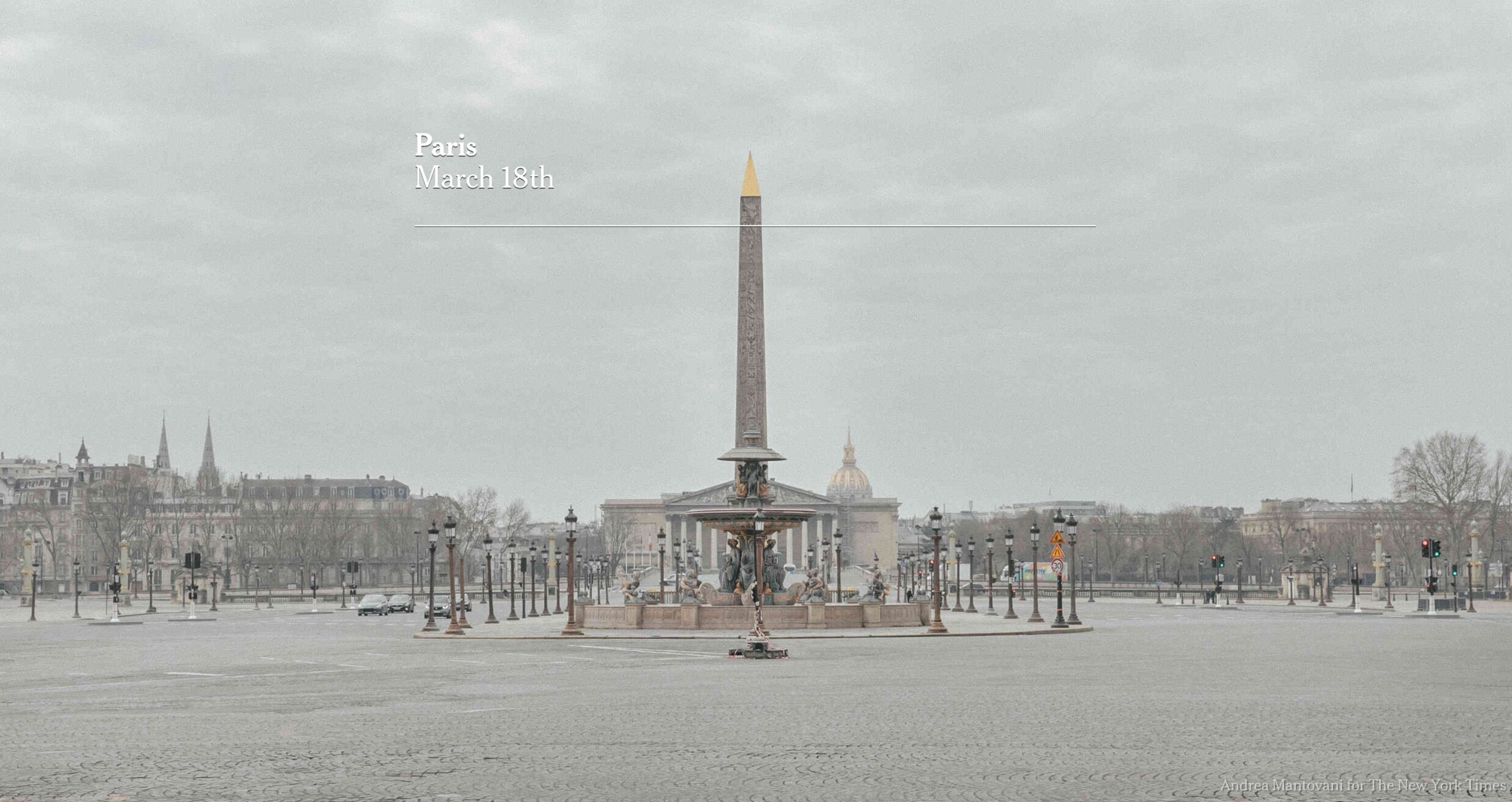These beautiful and poignant photos of normally bustling cities empty of humans are my favorite images captured of the lockdown last year.
Andrea Montovani for The New York Times
Today is the one year anniversary of our family’s pandemic experience. March 12, 2020 is the day I first closed my Pilates studio and the day my son’s school closed for a “two-week” quarantine.
In March of last year I think it’s safe to say that most of us couldn’t imagine that we’d still be living with such restrictions one year in the future. And yet here we are. Continuing to stretch ourselves and practicing the very important skill of being uncomfortable.
A few months before the pandemic I listened to Brené Brown’s excellent audiobook The Gifts of Imperfect Parenting. She talks about the importance of having a family gratitude practice with respect to the question: How do you raise kids who have everything they need to not be entitled? (And equally important, as an adult who has everything I need how do I keep myself from being entitled?) So two weeks before lockdown we all started writing in our own Five Minute Journal recommended by Tim Ferriss in his great conversation with (again) Brené Brown. My son has the kid version. In the beginning it was a great way for all of us to remind ourselves of how fortunate we were, right when it seemed as if all the “good stuff” was being taken from us. Now a year into the pandemic with all of its uncertainties, a few minutes spent writing in my gratitude journal has become an essential part of my morning routine.
When I think of gratitude I immediately think of David Steindl-Rast’s conversation with Krista Tippett. It resonated deeply with me when I first heard it years ago and I have been revisiting his words this week. As Krista writes “He calls joy ‘the happiness that doesn’t depend on what happens.’ And his gratefulness is not an easy gratitude or thanksgiving – but a full-blooded, reality-based practice and choice.”
From their conversation:
“Br. Steindl-Rast: Well, for me, this idea of listening and really looking and beholding — that comes in when people ask, “Well, how shall we practice this gratefulness?” And there is a very simple kind of methodology to it: Stop, look, go. Most of us — caught up in schedules and deadlines and rushing around, and so the first thing is that we have to stop, because otherwise we are not really coming into this present moment at all, and we can’t even appreciate the opportunity that is given to us, because we rush by, and it rushes by. So stopping is the first thing.
But that doesn’t have to be long. When you are in practice, a split second is enough — “stop.” And then you look: What is, now, the opportunity of this given moment, only this moment, and the unique opportunity this moment gives? And that is where this beholding comes in. And if we really see what the opportunity is, we must, of course, not stop there, but we must do something with it: Go. Avail yourself of that opportunity. And if you do that, if you try practicing that at this moment, tonight, we will already be happier people, because it has an immediate feedback of joy.
I always say, not — I don’t speak of the gift, because not for everything that’s given to you can you really be grateful. You can’t be grateful for war in a given situation, or violence or domestic violence or sickness, things like that. There are many things for which you cannot be grateful. But in every moment, you can be grateful.
For instance, the opportunity to learn something from a very difficult experience — what to grow by it, or even to protest, to stand up and take a stand — that is a wonderful gift in a situation in which things are not the way they ought to be. So opportunity is really the key when people ask, “Can you be grateful for everything?” — no, not for everything, but in every moment.”
My favorite film of late is the documentary The Biggest Little Farm. The cinematography is stunning, it is joyful, and it is a beautiful depiction of the complexity and wisdom found within the systems of nature. As Molly the farmer states, “The hardships we face make the dream feel so much more alive.” Rent it or watch it currently on Hulu. At a minimum watch the trailer…
Wise words from Alice Walker…
“Some periods of our growth are so confusing that we don’t even recognize that growth is happening. We may feel hostile or angry or weepy and hysterical, or we may feel depressed. It would never occur to us, unless we stumbled on a book or a person who explained to us, that we were in fact in the process of change... Whenever we grow, we tend to feel it, as a young seed must feel the weight and inertia of the earth as it seeks to break out of its shell on its way to becoming a plant... Often the feeling is anything but pleasant. But what is most unpleasant is the not knowing what is happening... Those long periods when something inside ourselves seems to be waiting, holding its breath, unsure about what the next step should be, eventually become the periods we wait for, for it is in those periods that we realize we are being prepared for the next phase of our life and that, in all probability, a new level of personality is about to be revealed.”


